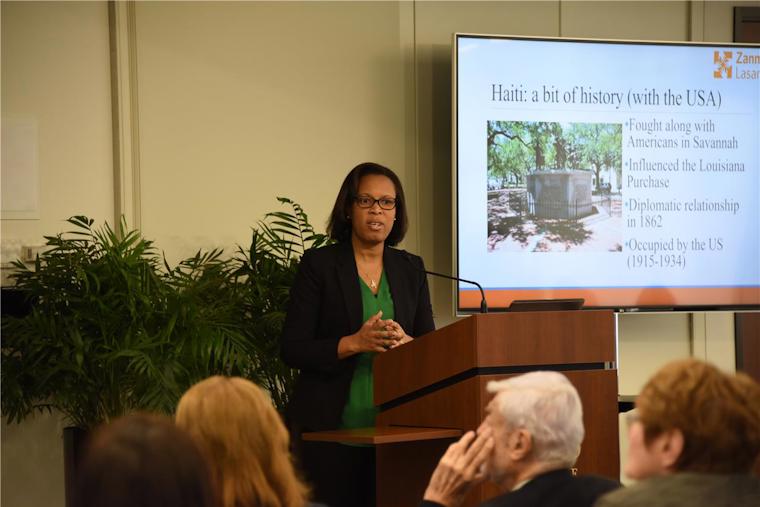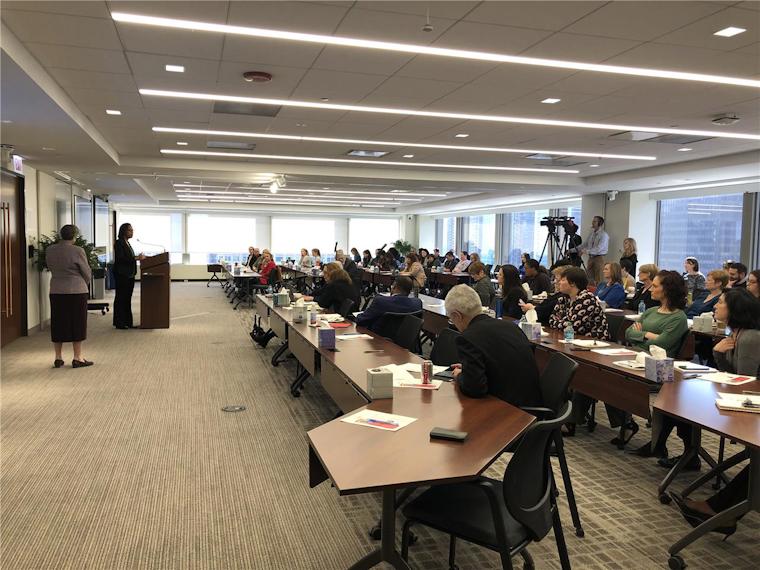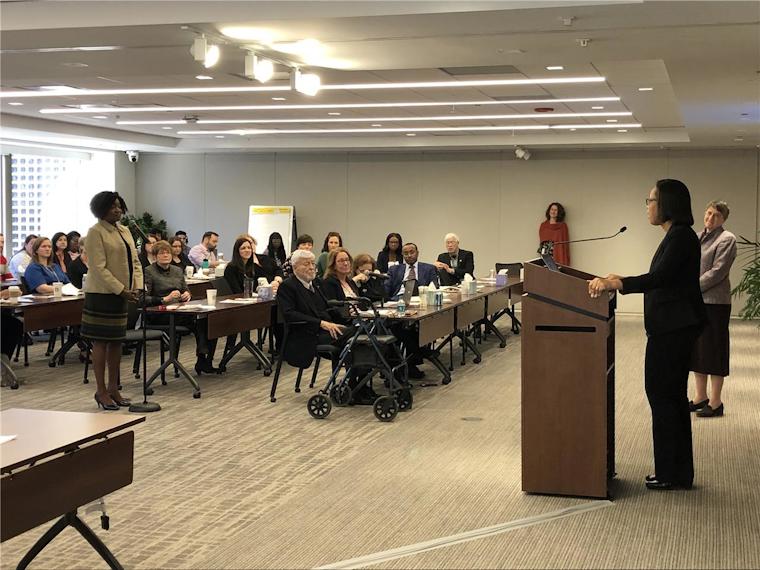The Caribbean nation of Haiti faces unique challenges in putting its philosophy that “health care is a right” into practice. Kerling Israel, MD, MPH described the work of Partners in Health/Zanmi Lasante (PIH/ZL) to improve the nation’s health care through graduate medical education (GME), and outlined the challenges faced and progress made in her recent Baldwin Seminar Series presentation, “Improving Graduate Medical Education in Haiti through Collaborative Work.” The talk was presented April 3, 2019 at the ACGME offices in Chicago. This talk was also the first of the series to be streamed online for a live audience.
Dr. Israel is director of medical education for PIH/ZL (a non-profit dedicated to providing high-quality health care to high poverty areas) and the program director for the family medicine residency at Hospital Saint Nicolas in St. Marc, Haiti. She provided a brief overview of Haiti and background on how medicine and medical education functioned in the country, giving context for her description of the work being done now to modernize and innovate medical education there.
Haiti is a Caribbean nation with complex socioeconomics, including a poverty rate of 58.5 percent (including 23.5 percent of the population living in extreme poverty), and a complex health system comprised of public and private (both profit and non-profit) sectors, as well as traditional healers, Dr. Israel said. There is an inadequate managerial system, limited financial resources, and a shortage of health care workers, such that even with the workers they have, the geographical distribution is severely unbalanced.
Innovations and Collaborations
After the January 2010 earthquake that devastated the country, a call went out to revamp Haiti’s medical education program. New national and international partnerships emerged to rebuild, and in some cases create, Haiti’s medical infrastructure and education programs.
In March 2013, PIH/ZL, working with the Ministry of Public Health and Population, opened the University Hospital of Mirebalais, a large institution that provides care to the community while focusing on high-quality training for health professionals. It is a model of how advanced medical education can work in Haiti, Dr. Israel said.
While Haiti has had the worst health indicators in the region, signs point to significant improvement.
“If we look at the numbers, they are terrible. But if we look at the trend, there is progress,” Dr. Israel said.
The hospital, known as University Hospital, is located in a rural area and provides services to nearly 100,000 patients. The facility includes state-of-the art equipment and technology, Dr. Israel said, and provides an opportunity to innovate.
The institution moved part-time faculty members into full-time educators, built a library of resources for research, and is incorporating research and quality improvement (QI) into the educators’ skills so they can pass on their knowledge to the residents and fellows.
The institution’s location was also strategic. By placing the hospital outside city centers, the residents/fellows are also training in community medicine, going into rural areas and treating patients where they are and where resources are scarcer. For the learners, most of whom attended medical school in Haiti’s capital of Port-au-Prince or in Cuba, the community health rotation is eye opening.
“They didn’t know what happened in this country,” Dr. Israel said of the residents. “When I went with them to a remote place and had them visit people’s homes, I remember many of them cried.” Because the institution is so remote, additional logistical support (e.g., housing) was provided to residents and fellows so they could focus on their studies.
The introduction of international standards to Haiti’s GME has also been key in advancements, Dr. Israel said. The institution has been using ACGME International’s standards to guide its work. These requirements, however, often have to be adapted, particularly in the context of community medicine, to accommodate the realities of working in rural areas where technological and financial resources are so scarce. By building flexibility into the programs in that way, the physicians are better prepared to serve their patients.
So far, the program has had positive results – of the 72 graduates so far, 66 are still working in Haiti, with many wanting to stay in the central plateau. “Everyone really wants to stay in the rural areas, if they can find jobs,” Dr. Israel said. “They would choose where the need is most important.”
Partnerships, Patience are Essential
Since University Hospital opened, those spearheading the effort to advance Haiti’s GME have learned many lessons.
First, addressing GME in a vacuum is not sufficient. Effective partnerships with local and regional medical schools, government officials, medical institutions in-country and abroad, and global support networks of physicians are essential.
“We have a lot of people working together to make this possible,” Dr. Israel said.
Getting faculty members and colleagues to not only follow international standards of evaluation and documentation, but understand why documentation is important and how data can be used to improve curriculum has been an effort, Dr. Israel said, because it is such a different way of approaching medical education. She added that bringing in colleagues from the US and Canada to share how they work and provide feedback has been helpful.
Partnerships can be short or long term, she said, but they need to make sense for the program as a whole. For example, they currently need more expertise in geriatrics-related subspecialties, she said, and human resource experts in staffing.
Second, changes come neither easily nor quickly, Dr. Israel said. When she embarked on the project, she rushed to make improvements, and soon realized that was not going to be successful.
“It takes time to implement a new culture of medical education,” she said. “We have to be patient.”
For Dr. Israel, the advancements made in University Hospital’s GME programs serves as a
model for how institutions with limited resources and big challenges can move forward effectively, and also as a rallying point for the larger Haitian medical education community to celebrate its ability to make Haiti a healthier place.
“We only train people who can change and transform the system,” she said. “By doing that, we create new models, successful models that can be replicated throughout the country.”
The ACGME’s Baldwin Seminar Series is offered free of charge to the community. Continuing professional development (CME) is offered for participation. If you were unable to attend this session, the live stream footage of Dr. Kerling’s presentation is available for viewing through May 3, 2019, and physicians can earn 1.5 AMA PRA Category 1 creditsTM. The live stream can be accessed on the Baldwin Seminar Series web page through the link to register for the April 3 livestream.
At the next Baldwin Seminar Series presentation on May 22, 2019 from 9:30-11:00 a.m., Dominic O. Vachon MDiv, PhD will discuss social determinants of health. Dr. Vachon is the director of the Ruth M. Hillebrand Center for Compassionate Care in Medicine at the University of Notre Dame. E-mail cme@acgme.org for more information, to RSVP to attend in person, or to join the invitation mailing list.






